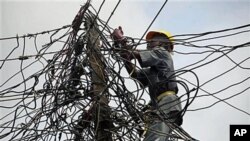Nigeria's announcement that it may build its first nuclear power plant is fueling concern the country is taking on too big and too dangerous of a project in an effort to end its constant power shortages. The announcement last Thursday came on the same day South Africa said it plans to build more nuclear plants.
Nigeria has such an acute energy problem that the country's constant power cuts are a chronic joke. After 30 years of stifling black-outs in this fast-growing country, however, Nigeria's leadership says nuclear power is a serious solution.
Last Thursday, President Goodluck Jonathan relaunched Nigeria's Atomic Energy Commission, which had temporarily paused after an earthquake in Japan shook confidence in atomic energy. The commission is tasked with planning what would be the first nuclear power plant in Nigeria, sub-Saharan Africa's second largest economy.
That same day the energy minister of South Africa, the continent's largest economy, announced it will build tens of billions of dollars worth of new nuclear plants.
Potential nuclear surge in Africa
Today, South Africa's colorfully-painted nuclear stacks are the only ones standing on the African continent. But by the end of the decade, nuclear physicists say, Africa could be a boom land for nuclear power contractors looking to fill this continent's gaping power shortage.
The nuclear announcements from sub-Saharan Africa's largest and second largest economies come at an odd moment: Six months ago, an earthquake-caused tidal wave slammed into a Japan's Fukushima nuclear power plant, crashing cooling systems that then failed to prevent simmering radiation from seeping into the sea.
Abubakar Sambo, director-general of Nigeria's Energy Commission, said he recognizes the risks that Nigeria's nuclear program could end in catastrophe. But in the face of a different, more daily type of disaster - Nigeria's brutal, day-long power cuts - he said Nigeria has no choice but to go nuclear.
"The case of Nigeria is a very pathetic one. Here we have a country that has about 150 million people. But the electricity available to the people is just hovering around 3,500 megawatts," said Sambo. "That is why the Nigerian government, any route, any source through which energy can be added to the Nigerian people, it will go for it."
Tapping alternative energy sources
Muna Lakhani, the Cape Town coordinator for the environmental group Earthlife Africa, wishes African states like Nigeria would opt for something greener. The continent, he said, is rich in sunlight, rivers and wind that energy companies - particularly Chinese firms - are becoming masters of harnessing.
"Quite frankly, I don't see the logic. The bottom line is that while it is absolutely true that electricity is a key component for development in Africa, there is no need whatsoever for us to follow the nuclear path," said Lakhani. "It's already very clear that alternative sustainable energy actually costs less per megawatt, and we have exactly those resources that alternative energy sources need, such as wind and sun."
Saharan winds and equatorial sunlight inevitably will power some portion of Nigeria's grid, said pro-nuclear advocate Kevin Kemm, CEO of South African energy consultant firm Stratek. However, he warned, there's no way scientists can make the sun shine bright enough or the wind blow fast enough, to provide the huge quantities of energy Nigeria needs to industrialize.
"You cannot build a modern African economy on the basis of a country's electricity supplies going up or down by substantial percentages. You can lose as much as half of the country's electricity if it doesn't rain," said Kemm.
Nuclear plants, he said, are becoming easier and cheaper to build and operate. Any African country - Nigeria included - he added, has the capacity to do nuclear.
Understanding nuclear ramifications
However, nuclear physicist Igor Khripunov said Nigeria's leaders really ought to take a pause and consider the magnitude of what they're proposing. He said nuclear power is dangerous, incredibly complex, expensive up front, and not particularly suited to Nigeria's energy needs. It would be reckless, he said, for Nigeria to rush into a prestige project just to prove its own know-how.
"After Fukushima, building a nuclear power infrastructure is becoming an international responsibility for any country. It's not just a national prerogative," he said.
The responsible path for Africa's aspiring nuclear nations to take, Khripunov said, would be to allow experienced nuclear contractors to build an internationally-operated nuclear station as part of a multi-national power pool. Even then, he said, it is something that could take more than a decade to complete.
"Given all the possible repercussions and effects. The country should really be part of an international community, and transparent, and cooperating in the full sense, not only technically, but also politically and logistically," he said.
Energy demand issues
Kemm added that Nigeria should start with small, 200-megawatt power plants, which are easier to run, and so compact they can be built almost anywhere.
Nigerian Energy Commission's Sambo said Nigeria is thinking big: 4,000 megawatts big.
"Because if you look at Nigeria of today, you look at the population, then you have to say what is the energy demand? The energy demand we have at the moment is being put in some quarters at 10,000 megawatts, some even put it at 20,000 megawatts. Because the situation we have is that of a suppressed demand."
Once Nigerians get a taste of daily, uninterrupted electricity, he said, homes will fill up with refrigerators, air conditioners, and all types of appliances. When that happens, he added, nothing but nuclear power will be able to meet Nigeria's needs.














